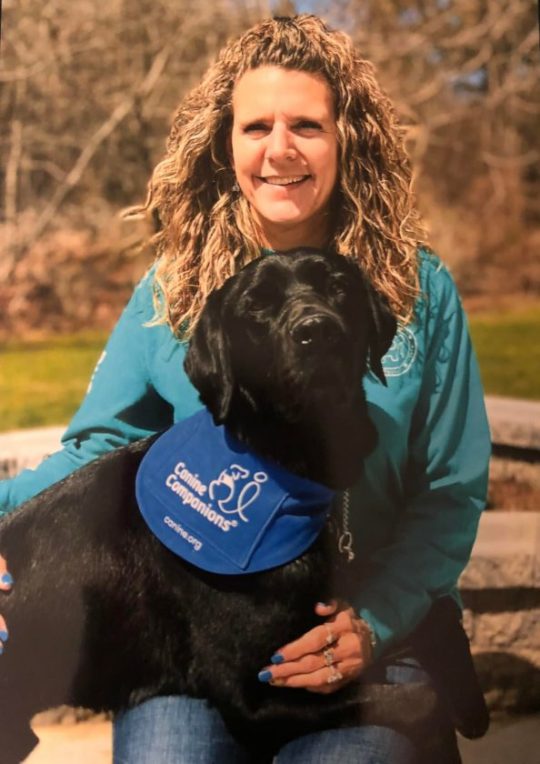 Justice Facility Dogs in Pennsylvania
Justice Facility Dogs in Pennsylvania

Jerri Rook
Pennsylvania State Coordinator
Justice Facility Dogs US
These agencies have professional handlers working with certified facility dogs in Pennsylvania.
Allegheny County Sheriff’s Office, Pittsburgh (CI)
Bucks County District Attorney, Doylestown (CPL)
Centre County District Attorney, Bellafonte (CPL)
Chester County Court, West Chester (CPL)
Clinton County Probation Services, Lock Haven (SSD)
Cumberland County Adult Probation and Parole, Carlisle (SSD)
Cumberland County Children and Youth Services, Carlisle (SSD)
Cumberland County district Attorney (SSD)
Elk County Courthouse, Ridgway Lancaster County District Attorney (CPL)
Lancaster County District Attorney, Lancaster (CPL)
Lancaster County Treatment Courts, Lancaster (SSD)
Lehigh County District Attorney (CPL)
Lycoming County Courthouse (CCI)
Mission Kids Child Advocacy Center, East Norriton (CPL)
Monroe County Court of Common Pleas (CCI)
Montgomery County District Attorney, Norristown (CPL)
Upper Darby Police Department (CCI)
Warren County Child Advocacy Center, Warren (Freedom Guide Dogs)
York County Court of Common Pleas (SSD)
York County Juvenile Probation (SSD)
York County Treatment Courts, York (SSD)

Facility dog Ludo, trained by Canine Companions, and handler Jerri Rook
Appellate Court Decisions
Commonwealth v. Purnell (2020)
Full text of the opinion here.
The Pennsylvania Supreme Court granted allocatur to consider two issues of first impression: (1) whether defendant was prejudiced during his murder trial when a minor witness was allowed to use a comfort dog when the witness testified, and (2) whether a finding of “necessity” or “need” is required in order for a trial court to allow the presence of service or support animals or items for a witness testifying at trial.
Superior Court summarized the relevant facts of the case as follows:
On the evening of October 3, 2016, in the area of Belmont Street and Sixth Avenue in Coatesville, Kevin Jalbert was shot seven times and killed. At the time of the shooting, Stacie Dausi, Justin Griest, and Sharon and Robert Swisher were inside the Swishers’ residence on Belmont Street and saw a group of black males in an adjacent alley and heard their voices grow louder and angrier. Griest and Mr. Swisher witnessed the murder and identified Appellant as the shooter, although Griest later recanted after he was assaulted on September 2, 2018.
Jalbert’s murder and Griest’s assault were also witnessed by A.H., an autistic minor. Prior to trial, the Commonwealth filed a motion asking the trial court to allow A.H. to have a “comfort dog” with her on the stand. The motion explained: “The comfort dog would enter the courtroom prior to the jury’s entrance. The comfort dog would exit the courtroom once all the jurors are excused from the courtroom. The comfort dog would remain in the witness stand outside the presence of the jury.”
During a pretrial hearing on the motion, Appellant objected to the dog’s presence in the court, expressing his concern that “the jury is going to see the dog somehow and they’re going to feel sympathy for [A.H.]” The trial court asked the Commonwealth why it was requesting a comfort dog for A.H. alone, when there were other minor witnesses in the case, and the Commonwealth answered: “A.H. has expressed to law enforcement that she is concerned about her safety coming to court and it’s for that reason the Commonwealth is asking for the dog to accompany her to the stand.” The trial court granted the Commonwealth’s motion. Without withdrawing his objection to the dog’s attendance, Appellant further argued that, if the trial court was going to allow the dog in the courtroom, the dog should be “out of the view of the jurors.”
Slip op. at 1-2 (footnote and internal record citations omitted). On appeal, Purnell argued that the trial court erred in allowing a comfort dog to accompany A.H. while she testified, because (1) the dog’s presence generated sympathy in the jury, which prejudiced his defense; and (2) the Commonwealth failed to establish its necessity.
Finding “no inherent prejudice in the presence of a comfort animal in a courtroom,” Superior Court concluded that Purnell failed to demonstrate he was prejudiced during his murder trial when A.H. was allowed to use a comfort dog when she testified. Slip op. at 26. The court reasoned that Purnell failed to show that he was harmed by the trial court’s decision to allow use of comfort dog, the trial court followed procedures to minimize the dog’s presence, and that Purnell’s assumption that the dog generated sympathy without any evidence in support thereof was unsubstantiated and ignored the fact that some people were afraid of or disliked dogs.
As to whether the Commonwealth was required to show necessity, Superior Court noted that “courts are split on whether the prosecution must prove that the special measure of a comfort or support item for a minor or special needs witness is necessary to secure the witness’s testimony.” Slip op. at 23. However, the court further noted that in “the cases concerning comfort dogs in the courtroom specifically, of those that addressed whether the trial court must find the presence of the dog to be a necessity or need, all concluded that such a determination was unwarranted.” Slip op. at 24. Moreover, the court acknowledged, “all of the cases holding that a finding of necessity is not required are from the past decade, whereas the only case in the past decade insisting upon the finding of necessity is [Gomez v. State, 25 A.3d 786, 798–99 (Del. 2011) (requiring prosecution to show that special measure is necessary to facilitate witness’s testimony, adopting “substantial need” standard)] with [State v. Palabay, 844 P.2d 1 (Haw. Ct. App. 1992) (requiring prosecution to show that special measure is necessary to facilitate witness’s testimony, adopting “compelling necessity” standard)] and [State v. Cliff, 782 P.2d 44 (Idaho Ct. App. 1989)] being more than a quarter century old; the modernity of the cases not insisting on necessity therefore gives them greater persuasive value.” Slip op. at 26. Persuaded by similar holdings in a majority of jurisdictions, Superior Court held that “a trial court need not find a compelling necessity for the animal’s presence, provided that the animal alleviates a witness’s stress, hence allowing the witness to testify veraciously and thoroughly.” Id.
Commonwealth v Purnell 2021
The Pennsylvania Supreme Court granted allocatur to consider the following issues:
(1) Did the Superior Court err in affirming the trial court’s decision to permit a dog to accompany a testifying witness?
(2) Mindful of the rights of the accused, should a showing of need for special accommodation be required prior to its allowance?
A trial witness may be accompanied by a “comfort dog” if the animal will help yield reliable, complete, and truthful testimony, the justices ruled Wednesday in a precedent-setting opinion that established a “balancing test” for Pennsylvania judges confronted with such a request.
Ruling unanimously in a murder case, the Supreme Court pointed to other states that allow witnesses to testify with the help of emotional support dogs. The justices said it’s permissible, as long as steps are taken to minimize any potential harm to a defendant.
“Trial courts have the discretion to permit a witness to testify with the assistance of a comfort dog,” Chief Justice Max Baer wrote for the court. “In exercising that discretion, courts should balance the degree to which the accommodation will assist the witness in testifying in a truthful manner against any possible prejudice to the defendant’s right to a fair trial.”
The defendant, Sheron Purnell, was convicted of third-degree murder in the 2016 shooting death of a man in Coatesville and was given a prison sentence of up to 47 years.
Purnell’s lawyers argued that a Chester County judge abused his discretion by allowing a comfort dog to accompany a teenage witness who testified against Purnell at trial. The defense argued the dog, part of the sheriff’s K-9 unit, would “generate sympathy” among jurors for the girl.
Prosecutors argued the dog was trained to accompany witnesses in court and would help allay the girl’s fear of testifying.
The judge allowed it but said the dog, a black Lab named Melody, had to remain under the witness stand throughout the teenager’s testimony. He also instructed jurors to ignore the dog for purposes of assessing the witness’s credibility and said they should not view her more sympathetically.
The Supreme Court said the judge had acted reasonably.
“We note that there is nothing in the record to suggest that the comfort dog was in any way disruptive to the trial,” the court said.
The justices adopted rules established by Connecticut’s high court and said they would apply to Pennsylvania state court cases. Judges can limit any potential prejudice to a defendant by blocking jurors’ view of the dog and giving appropriate jury instructions, the court said.
“After finding no merit to Appellant’s prejudice argument, the Superior Court stated in a footnote that, when faced with a question of whether a State witness’ use of a comfort dog prejudiced a criminal defendant, the Supreme Court of Connecticut adopted a balancing test in State v. Devon D., 138 A.3d 849 (Conn. 2016). Id. at 837 n.11. In that case, the Supreme Court of Connecticut held that a “trial court should consider the particular facts and circumstances for the request to have a dog accompany the particular witness, the extent to which the dog’s presence will permit the witness to testify truthfully, completely and reliably, and the extent to which the dog’s presence will obviate the need for more drastic measures to secure the witness’ testimony.” Id. The Court then noted that a “trial court should balance these factors against the potential prejudice to the defendant and the availability of measures to mitigate any prejudice, such as limiting instructions and procedures to limit the jury’s view of the dog.”
ADI Accredited Organizations
The following organizations place facility dogs in the state of Pennsylvania. Please visit their websites to find out more about each organization.
ADW – Assistance Dogs of the West
CPL – Canine Partners for Life
ECAD – Educated Canines Assisting with Disabilities

